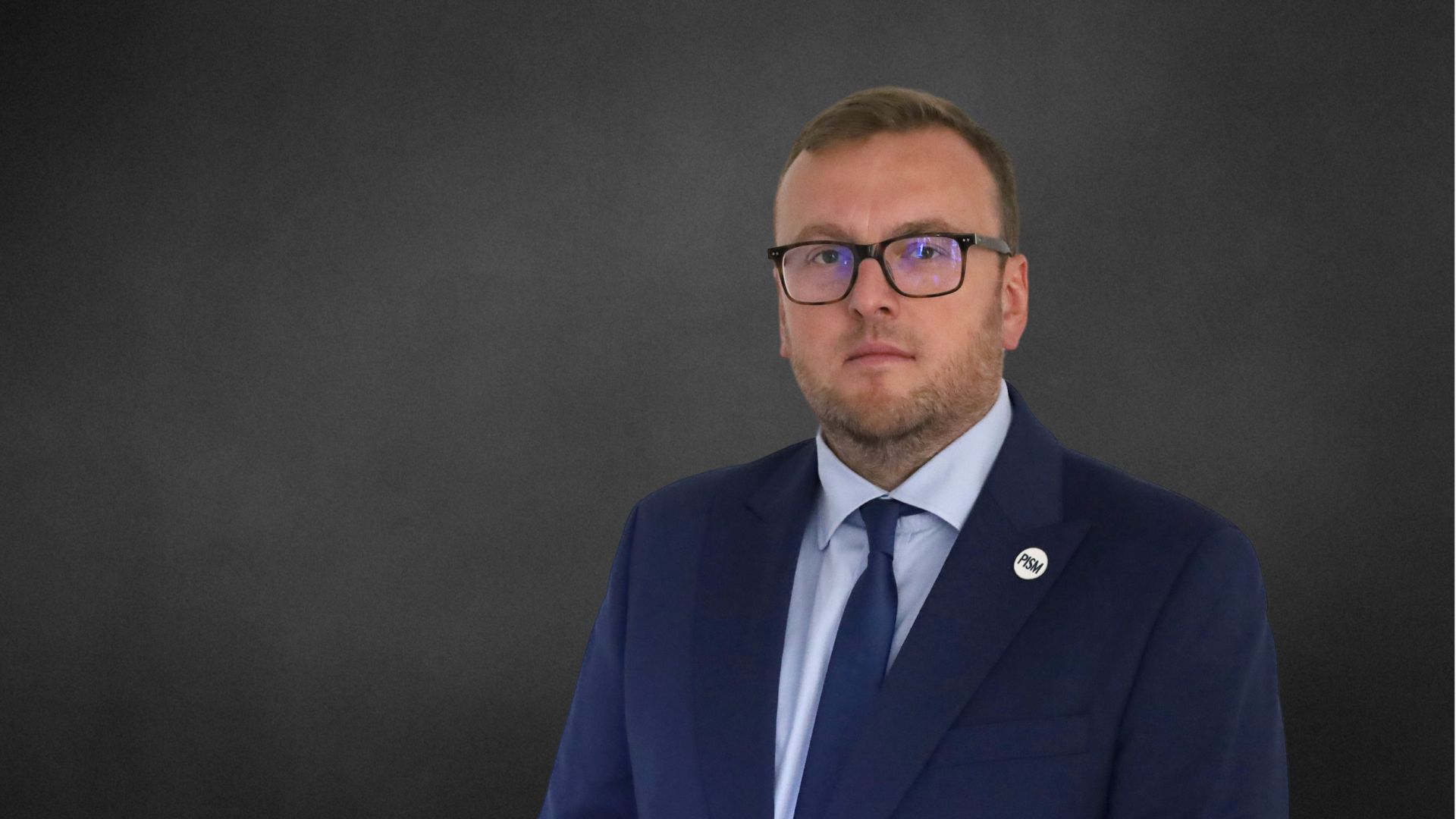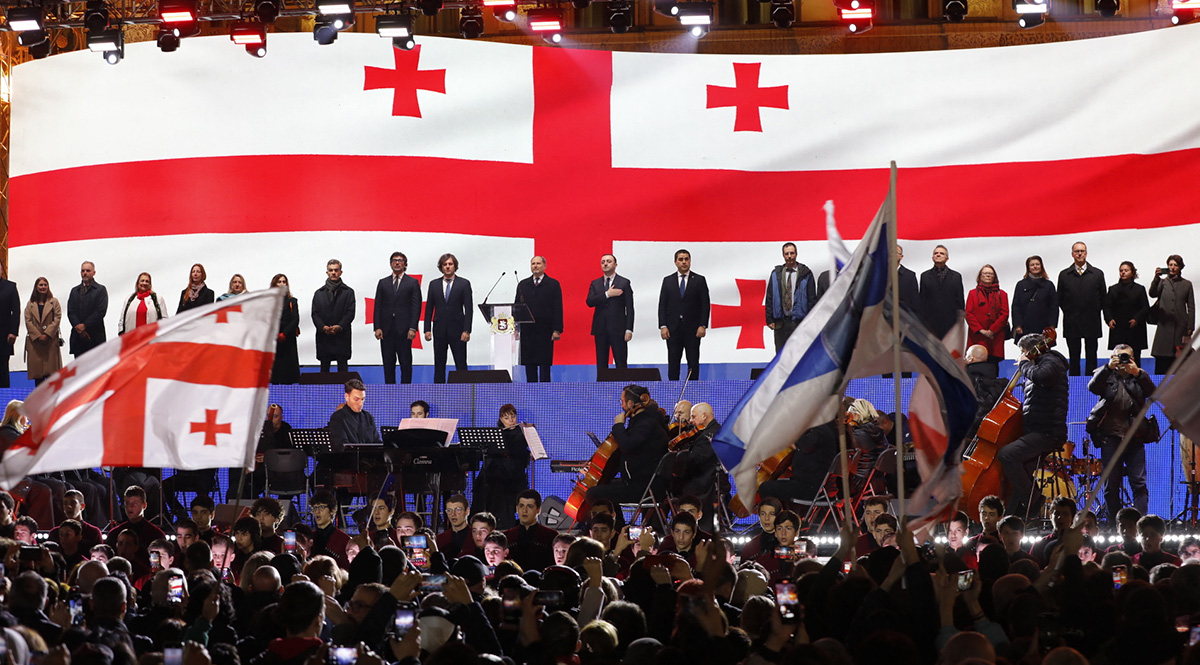Georgia Facing Key Parliamentary Elections
In the parliamentary elections in Georgia scheduled for 26 October, the ruling Georgian Dream (GD) will fight to stay in power for a fourth term. The political camp of former Prime Minister Bidzina Ivanishvili stresses that a possible victory for the opposition will mean Georgia will be dragged further into a conflict with Russia. The opposition, on the other hand, warns that a continuation of GD rule will result in a deepening of authoritarian tendencies, a further dependence of Georgia on Russia, and the loss of any chance of Georgia’s integration into the EU. Pre-election opinion polls do not indicate a clear winner.
.png) Irakli Gedenidze / Reuters / Forum
Irakli Gedenidze / Reuters / Forum
Stakes of the Election
The elections are presented as a chance at a breakthrough by both the ruling party and the opposition. The ruling GD presents it as a choice between peace, which the ruling camp has supposedly ensured during its 12 years in power so far, and war, which would be brought to the country by the opposition, President Salome Zurabishvili, NGOs, and free media, which GD describes as foreign agents. The opposition, on the other hand, sees the election as a kind of referendum in which Georgians will decide whether their country will return to the path of democracy and European integration or continue to move towards ever-sharper authoritarianism and a drift towards Russia and China.
The ongoing campaign is influenced by the law on so-called foreign agents, in force since August this year, which requires the registration of entities, including media and NGOs, that are at least 20% financed by foreign funds. The law has been challenged, among others, by opposition parties and the president to the Constitutional Court and has met with opposition from the third sector. So far, only 1.5% of obliged entities have signed up to the special register. Those that have not will soon face financial penalties or forced registration or cessation of their activities (their bank accounts may be blocked and their property and equipment seized). Following the adoption of the law in Georgia, the EU and the U.S. restricted relations with Georgia (including the suspension of the European integration process and the cancellation of U.S.-Georgian military exercises), imposed sanctions on the Georgian authorities, and do not rule out further sanctions if the Georgian democracy continues to deteriorate.
The Ruling Party
GD stresses that its retention of power will mean the continuation of peace and stability for Georgia and that it will contribute to the strengthening of Georgian traditions and values (to this end, the ruling party recently passed a law banning so-called homosexual propaganda). Leaders of the power camp in the campaign boast of high economic growth (7.5% in 2023), low inflation (2.5% in 2023), a decrease in the percentage of people living below the poverty line (from 30% in 2012 to 11.8% in 2023), and promise to continue these trends. They emphasise that they need to obtain a constitutional majority (two-thirds of the seats in parliament) in the next term in order to strengthen the Georgian state and restore its territorial integrity (there is speculation in the media space about a possible confederation of Georgia with Abkhazia and South Ossetia after the earlier recognition of their independence by Georgia). This type of rhetoric is intended to mobilise the GD electorate and is indicative of the ruling party’s fear of losing its simple majority in parliament. Formally, GD still maintains its desire for European integration, but its actions strongly contradict the declarations made.
The GD has administrative resources (control of public institutions and local governments), media and financial clout, legally harasses NGOs and free media (there have also been cases of physical assaults on NGO workers by unknown perpetrators), and announced the banning of the opposition after a possible election victory under the pretext of punishment for provoking the war with Russia in 2008. Its politicians stress that the opposition enjoys little popular support, will not accept the results of the vote, and is already preparing for street demonstrations aimed at a coup. Support for GD, according to published polls, is 34-60% (depending on who they are commissioned by). However, the results of the polls are affected by the around 40% of voters who still do not know for whom they will cast their vote in the elections.
Opposition
The pro-Western opposition fragmented over the years. It consisted of more than a dozen political parties at one point. However, in recent months, it has partially consolidated and will eventually run in three blocs: the liberal-conservative Unity-Save Georgia (United National Movement, Agmashenebeli Strategy, European Georgia), the centre-liberal Strong Georgia (Lelo for Georgia, For the People, Citizens, Freedom Square), and the centre-right Coalition of Change (Achali, Droa, Girchi-More Freedom, Republican Party). The social-liberal party For Georgia will take part in the elections independently. The opposition enjoys combined support of around 31-49%, but this is dispersed. Running in coalitions therefore guarantees that it will cross the 5% electoral threshold and the votes cast for it will not be wasted.
The opposition announced the formation of a coalition government, whose main task will be to return Georgia to a pro-democratic and pro-European path. The opposition parties emphasise that their goal is to implement the reforms put forward to Georgia by the European Commission last December. They stress that the upcoming elections will provide an opportunity to remove from power a government whose actions have resulted in Georgia’s increasing international isolation. In addition, the opposition declares its desire to start accession negotiations with the EU as soon as possible and promises to secure €14 billion in pre-accession funds. It assures that it will repeal the “foreign agents” law and limit Russian influence (including through visa restrictions for Russians; currently, Russians can enter Georgia freely). The main opposition party United National Movement announced it would increase pensions, support families and fertility, and create new jobs.
The opposition stresses that GD has the lowest support in its 12 years of rule and that it will use all possible methods and means, including electoral fraud, to retain power. According to the opposition, GD’s weakness is indicated by the fact that the list will be headed for the first time by the party’s founder and honorary chairman Ivanishvili, who is expected to mobilise the GD electorate but whom the opposition considers a pro-Russian oligarch.
President Zurabishvili, who has emerged as the patron of a united front of pro-Western forces, is playing an important role in the election campaign. She has participated in talks between the various parties on issuing joint electoral lists, encourages Georgians to vote in large numbers for pro-European forces, and strongly criticises the ruling party for its anti-democratic and anti-Western actions and rhetoric. In September, she announced her intention to stay on as president for a second term (the first term will end in December this year), during which she wants to put Georgia back on a pro-European course and support a new parliamentary majority.
Conclusions and Perspectives
The upcoming parliamentary elections will be of fundamental importance for Georgia’s political system and the direction of its foreign policy. A win by the opposition and the formation of a coalition government offers hope for re-democratisation and Georgia’s further integration into the EU, as well as the repair of relations with the U.S. The retention of power by the GD will most likely mean further degradation of the political system, deterioration of freedoms for NGOs and free media, and less respect for human rights. In addition, a GD-led Georgia probably will continue to distance itself from its existing Western partners and intensify ties with authoritarian countries, primarily Russia, but also China.
If the GD decides to partially falsify the results of the vote or fails to recognise its eventual defeat, mass protests should be expected. They may be larger than those in the spring of this year when protestors marched against the law on so-called foreign agents. It turned into a street confrontation between the ruling party and law enforcement forces on one side and the opposition and its supporters on the other. Given the stakes and potential volatility, Poland may consider proposing EU mediation with the aim of reaching a compromise to ensure de-escalation of the situation inside Georgia. Should the GD reject the mediation proposal and break up demonstrations, Poland may propose that the EU introduce stronger sanctions than before, such as temporarily suspending visa-free travel, completely withholding financial aid to Georgia, or revoking its candidate status for EU membership.
Until the vote takes place, EU Member States and institutions should appeal to the Georgian authorities to hold free and fair elections, support the third sector, including organisations monitoring the vote. Furthermore, they could consider calling on all the political forces in Georgia to conduct a calm and substantive election campaign. Poland could propose strengthening the election observation mission being prepared by the Organisation for Security and Cooperation in Europe, as well as organising additional missions, such as one from the European Parliament.





